Migrating from Glassfy
Glassfy has announced that they will be ceasing operations in December 2024, and we're here to support the users during the transition. Enjoy 6 months of the Qonversion completely for free, allowing you plenty of time to get comfortable with all that Qonversion has to offer.

To ensure a smooth transition, we have prepared a migration guide to help you move seamlessly from Glassfy to Qonversion.
First and foremost, register at Qonversion.
The registration will take you through an onboarding where you'll have to fill out information about your project, insert links - all to help you add your project to Qonversion. We highly recommend following this flow and not skipping any settings during registration. Anyway, we'll also cover the scenario if you don't fill these out.
Store Configuration
Connecting App Store
Here's what you had in Glassfy:
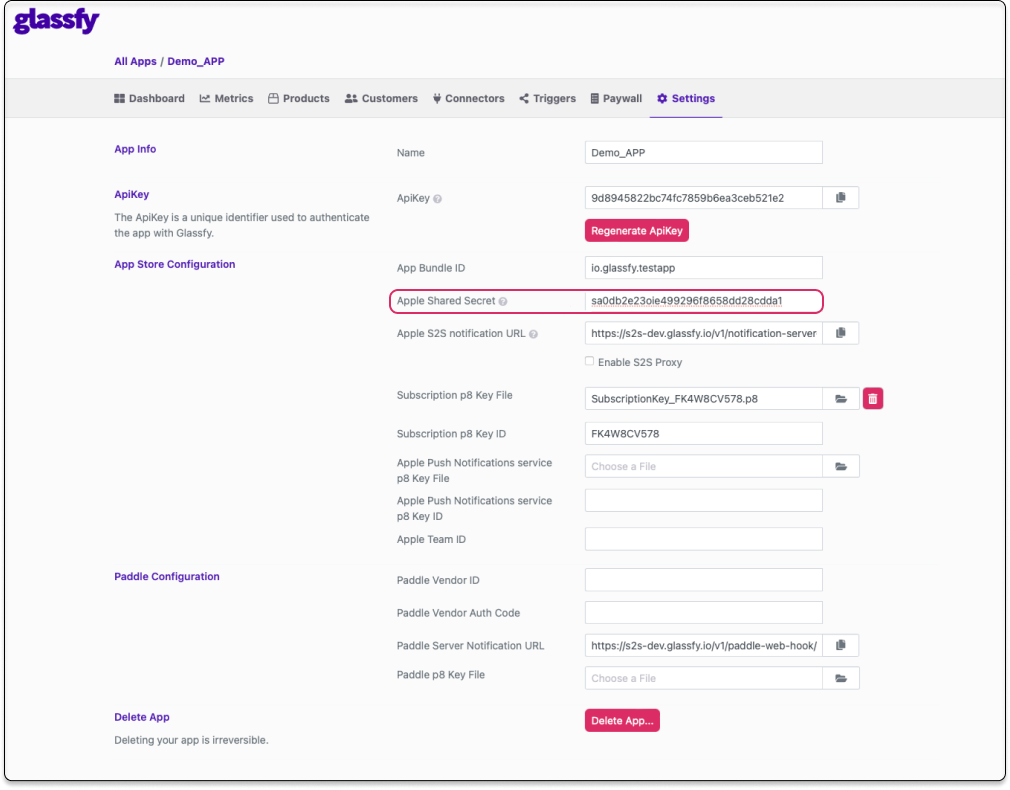
To configure App store in Qonversion, you will need the following fields:
- App-Specific Shared Secret: Simply copy this value from the Apple Shared Secret field in the App Store Configuration section in Glassfy. Check the screenshot above. Alternatively, here's a more detailed guide on how to obtain this.
- App Store ID: You'll find your App Store ID in the URL of your App Store Connect account. For example, if your URL is something like https://apps.apple.com/us/app/example-app/id123456789, then 123456789 is your app’s Apple ID.
Connecting Google Play Console
Here's what you saw at Glassfy:

To set up your Google Play account in Qonversion, you will need the following:
- Android Package Name: This is usually the applicationID in your app-level build.gradle file. You can either copy it from there or simply copy the Android Package Name field in your settings from Glassfy.
- Service Account Credentials JSON: Copy the value from the Google JSON Key in the screenshot above or simply attach the same file you used in Glassfy. Here's more on how you can get Google Play Service Account Key.
Can't find the fields?If you skipped filling in these details during the onboarding, navigate to the Settings -> Stores on your Qonversion dashboard and fill out the empty fields.
Offerings, Products, and Entitlements
Once all the data is filled in and the stores are set up, it's time to configure Offerings, Products, and Entitlements.
Here's how we refer to the same things differently:
| Glassfy | Qonversion |
|---|---|
| Permissions | Entitlements |
| SKUs | Products |
| Offerings | Offerings |
Entitlements (Permissions)
Let's start with Entitlements. Similar to how you set up Permissions in Glassfy, you need to set up Entitlements in Qonversion.
Here’s how it was done in Glassfy:
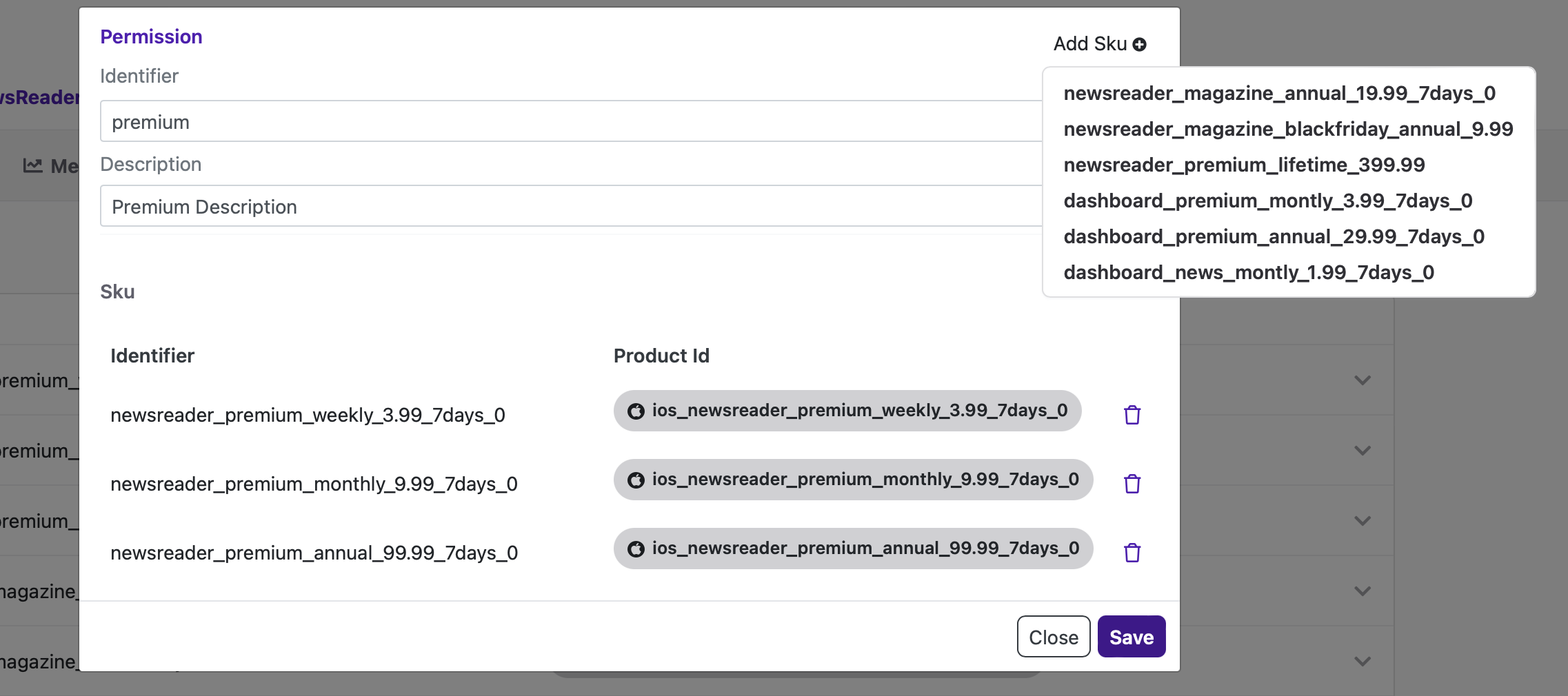
Here’s how to do it in Qonversion:
Navigate to the Entitlements and click the Create Entitlement button.
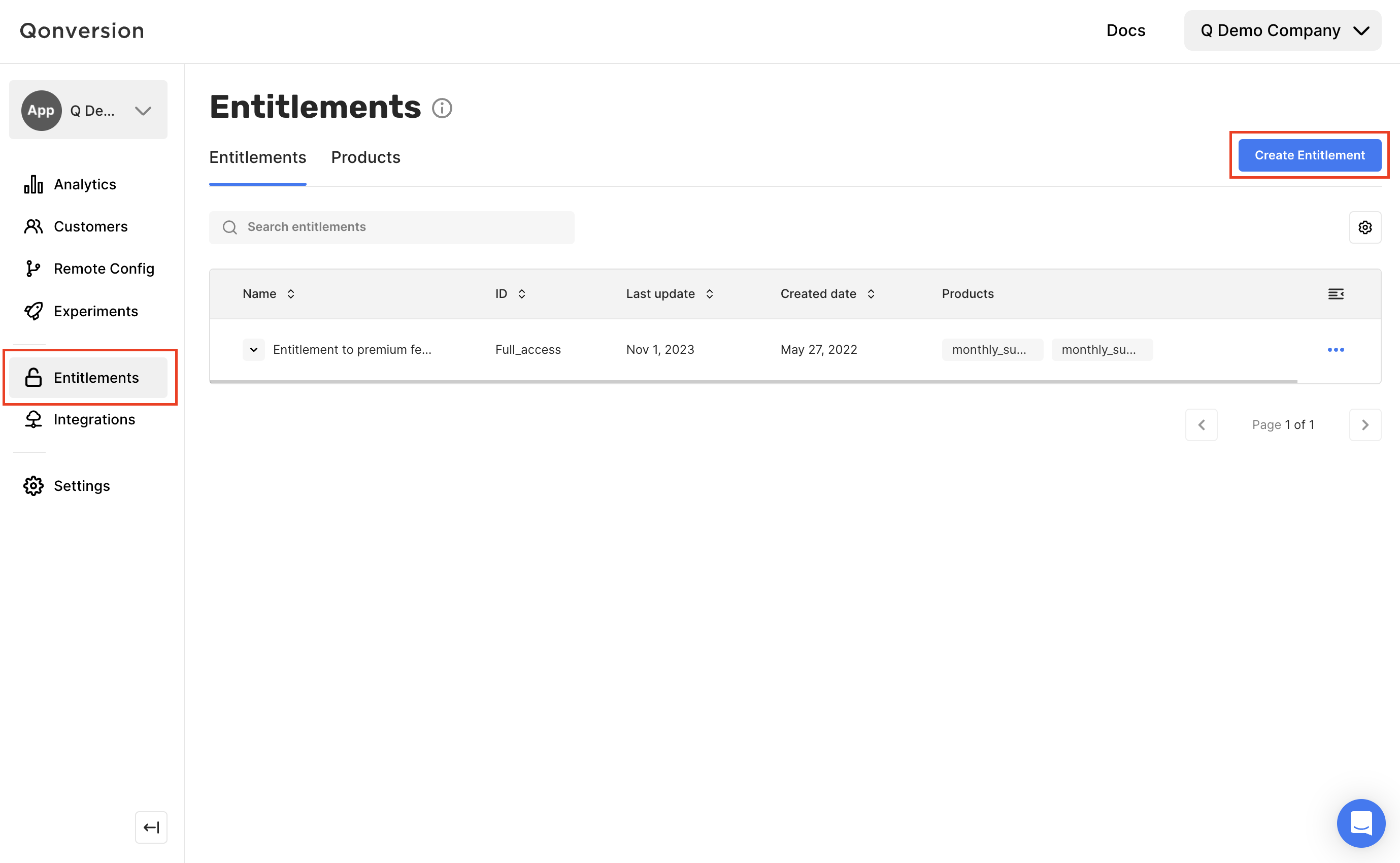
Products (SKUs)
Next, you need to create Products similar to how you created SKUs in Glassfy:
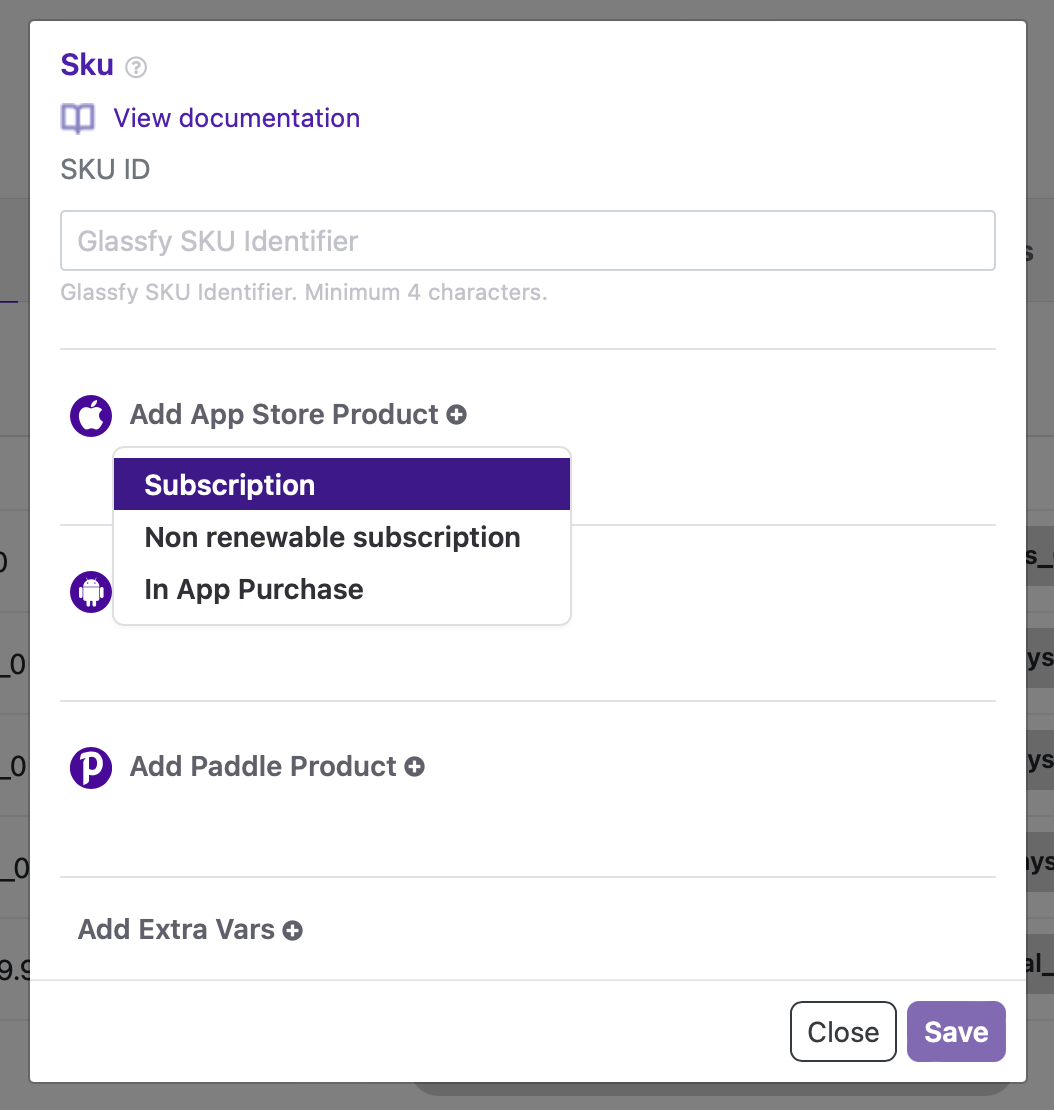
To create Products in Qonversion, go to Entitelments --> Products and click Create Product.
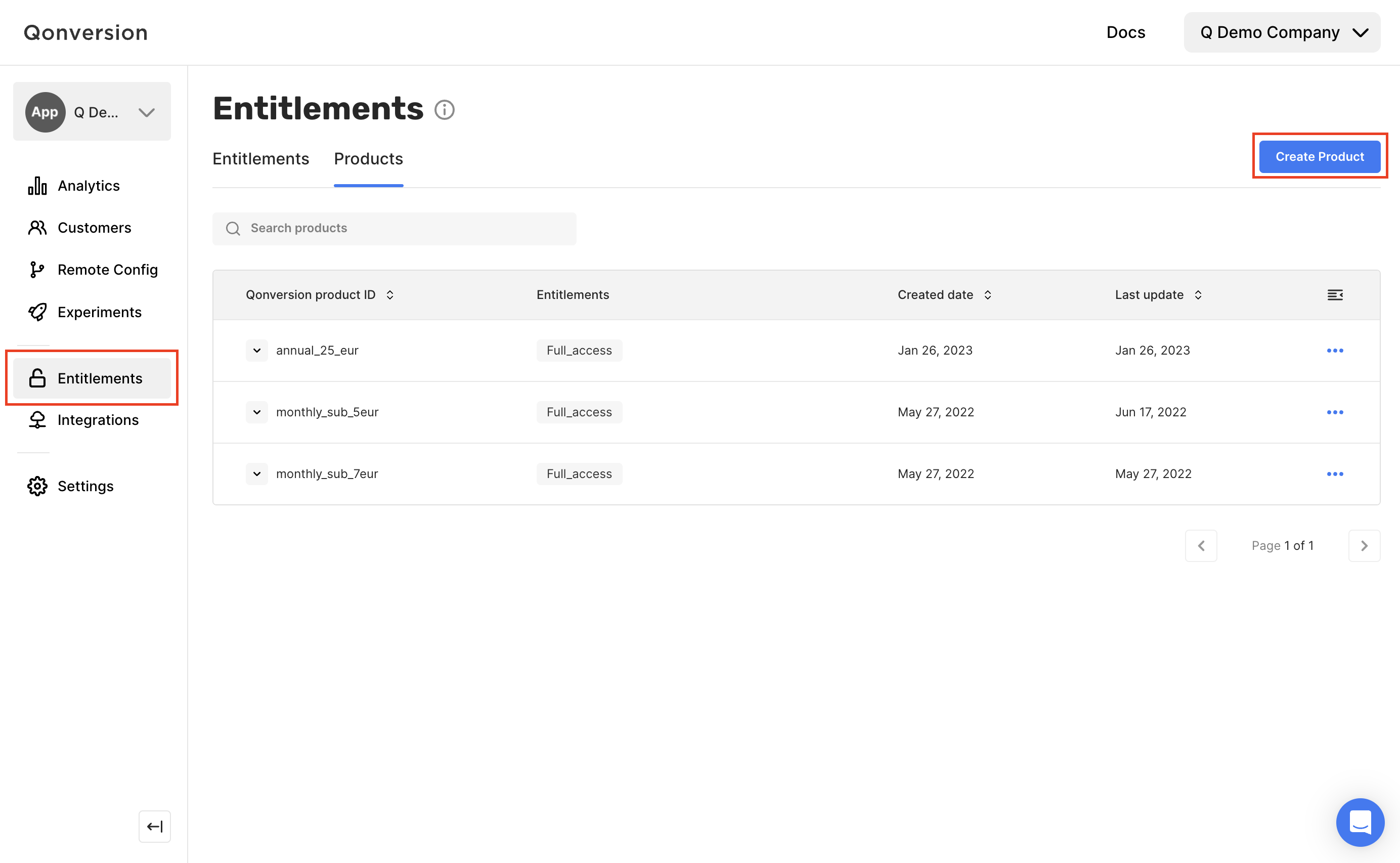
- Fill in the product details.
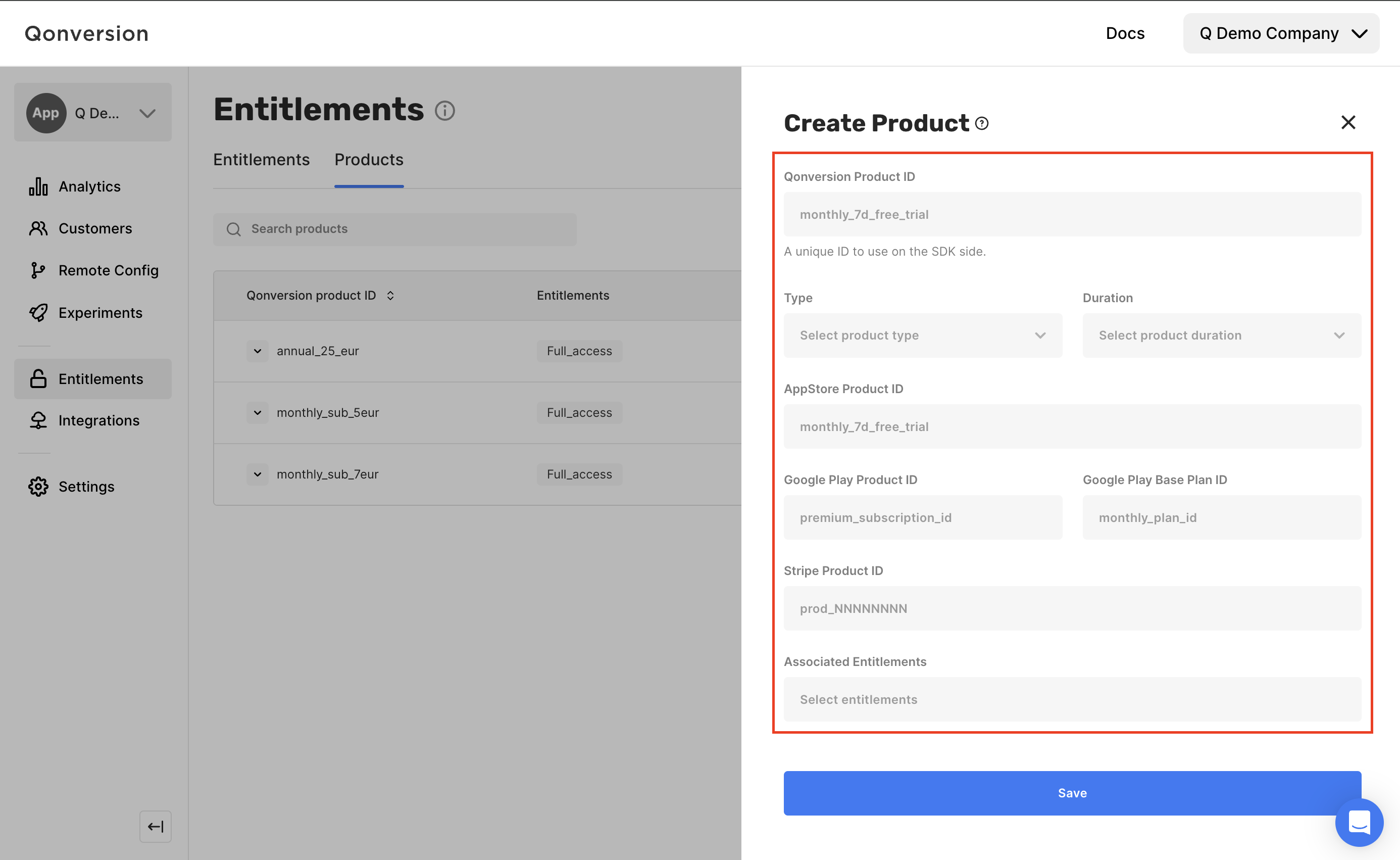
-
Qonversion Product ID – create your unique product identifier in Qonversion that corresponds to a unique product on the Apple App Store and Google Play Store. Qonversion SDK will use it to make purchases.
-
AppStore Product ID – product identifier on Apple App Store. Learn more on how to create subscriptions on iOS.
-
Google Play Product ID – product identifier on Google Play Console. Learn more on how to set up Android in-app products .
-
Google Play Base Plan ID - identifier of the base plan for Google Play Product. This is used for subscription products. If you're creating an in-app, leave this field empty for in-apps. In Qonversion, you will set up different products for the different base plans of the same product.
-
Associated Entitlements - choose the entitlements that should be granted once this product is purchased.
Offerings
Here's what your Offering setup looked like at Glassfy:
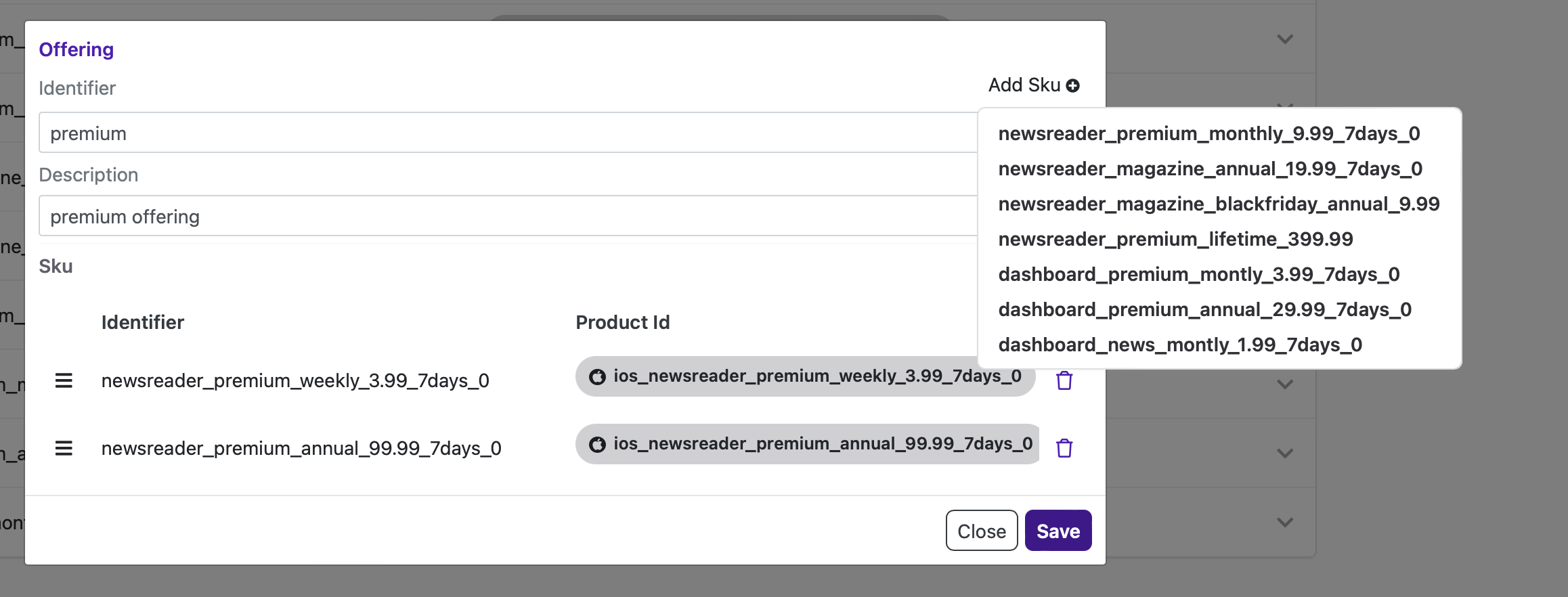
In Qonversion, simply navigate to the Remote Config -> Offerings from your dashboard and add the offerings similarly as you did it in Glassfy.
Now, move to installing your SDK and getting your hands into the code a bit.
Install the SDK
Check out the links below for the SDK you need and follow the steps provided:
→ iOS SDK
→ Android SDK
→ Flutter SDK
→ React Native SDK
→ Unity SDK
→ Cordova Plugin
→ Capacitor Plugin
→ Web
→ Kids Mode Qonversion SDKs
Read more about Installing the SDKs.
When you're done with the setup, it's time to get into the code!
Launch SDK
Firstly, you need to initialize the SDK. Here's how you did it in Glassfy:
func application(_ application: UIApplication, didFinishLaunchingWithOptions launchOptions: [UIApplication.LaunchOptionsKey: Any]?) -> Bool {
Glassfy.initialize(apiKey: "YOUR_API_KEY", watcherMode: false)
}- (BOOL)application:(UIApplication *)application didFinishLaunchingWithOptions:(NSDictionary *)launchOptions {
[Glassfy initializeWithAPIKey:@"YOU_API_KEY" watcherMode:NO];
}public class App extends Application {
@Override
public void onCreate() {
super.onCreate();
Glassfy.initialize(this, "YOUR_API_KEY", false, null);
}
}class App : Application() {
override fun onCreate() {
super.onCreate()
Glassfy.initialize(this, "YOUR_API_KEY", false, null)
}
}try {
await Glassfy.initialize('YOU_API_KEY',watcherMode: false);
} catch (e) {
// error
[...]
}try {
await Glassfy.initialize('YOU_API_KEY', false);
} catch (e) {
// initialization error
[...]
}try {
await Glassfy.initialize({ apiKey: 'YOU_API_KEY', watcherMode: false });
} catch (e) {
// initialization error
}Here's how you'll do it for Qonversion.
import Qonversion
func application(_ application: UIApplication, didFinishLaunchingWithOptions launchOptions: [UIApplicationLaunchOptionsKey: Any]?) -> Bool {
let config = Qonversion.Configuration(projectKey: "projectKey", launchMode: .subscriptionManagement)
Qonversion.initWithConfig(config)
return true
}#import "Qonversion.h"
- (BOOL)application:(UIApplication *)application didFinishLaunchingWithOptions:(NSDictionary *)launchOptions {
QONConfiguration *configuration = [[QONConfiguration alloc] initWithProjectKey:@"projectKey" launchMode:QONLaunchModeSubscriptionManagement];
[Qonversion initWithConfig:configuration];
return YES;
}import com.qonversion.android.sdk.Qonversion;
import com.qonversion.android.sdk.QonversionConfig;
import com.qonversion.android.sdk.dto.QLaunchMode;
public class App extends Application {
@Override
public void onCreate() {
super.onCreate();
final QonversionConfig qonversionConfig = new QonversionConfig.Builder(
this,
"projectKey",
QLaunchMode.SubscriptionManagement
).build();
Qonversion.initialize(qonversionConfig);
}
}import com.qonversion.android.sdk.Qonversion
import com.qonversion.android.sdk.QonversionConfig
import com.qonversion.android.sdk.dto.QLaunchMode
public class App : Application {
override fun onCreate() {
super.onCreate()
val qonversionConfig = QonversionConfig.Builder(
this,
"projectKey",
QLaunchMode.SubscriptionManagement
).build()
Qonversion.initialize(qonversionConfig)
}
}import 'package:qonversion_flutter/qonversion_flutter.dart';
final config = new QonversionConfigBuilder(
'projectKey',
QLaunchMode.subscriptionManagement
).build();
Qonversion.initialize(config);import Qonversion, {
QonversionConfigBuilder,
LaunchMode,
} from 'react-native-qonversion';
const config = new QonversionConfigBuilder(
'projectKey',
LaunchMode.SUBSCRIPTION_MANAGEMENT
).build();
Qonversion.initialize(config);using QonversionUnity;
private void Start()
{
QonversionConfig config = new QonversionConfigBuilder(
"projectKey",
LaunchMode.SubscriptionManagement
).Build();
Qonversion.Initialize(config);
}const config = new Qonversion.ConfigBuilder(
'projectKey',
Qonversion.LaunchMode.SUBSCRIPTION_MANAGEMENT,
).build();
Qonversion.initialize(config);import Qonversion, {
QonversionConfigBuilder,
LaunchMode,
} from '@qonversion/capacitor-plugin';
const config = new QonversionConfigBuilder(
'projectKey',
LaunchMode.SUBSCRIPTION_MANAGEMENT
).build();
Qonversion.initialize(config);Displaying products
Glassfy:
Glassfy.offerings { (offerings, err) in
if let offering = offerings?["premium"] {
// display your offering's skus
for sku in offering.skus {
// sku.extravars
// sku.product.localizedTitle
// sku.product.localizedDescription
// sku.product.price
}
}
}[Glassfy offeringsWithCompletion:^(GYOfferings *offers, NSError *err) {
GYOffering *offering = offers[@"premium"];
if (offering) {
// display your offering's skus
for (GYSku *sku in offering.skus) {
// sku.extravars
// sku.product.localizedTitle
// sku.product.localizedDescription
// sku.product.price
}
}
}];Glassfy.offerings() { offers, err ->
offers?.all
?.firstOrNull { it.offeringId == "premium" }
?.also {
// display your offering's skus
for (sku in it.skus) {
// sku.extravars
// sku.product.title
// sku.product.description
// sku.product.price
}
}
}Glassfy.offerings(new OfferingsCallback() {
@Override
public void onResult(@Nullable Offerings offers, @Nullable GlassfyError err) {
Offering offering = null;
if (offers != null) {
for (Offering o : offers.getAll()) {
if (o.getOfferingId().equals("premium")) {
offering = o;
}
}
}
if (offering != null) {
// display your offering's skus
for (Sku sku : offering.getSkus()) {
// sku.getExtravars();
// sku.getProduct().getTitle();
// sku.getProduct().getDescription();
// sku.getProduct().getPrice();
}
}
}
});try {
var offerings = await Glassfy.offerings();
var offering = offerings.all
?.singleWhere((offering) => offering.offeringId == 'premium');
offering?.skus?.forEach((sku) {
// sku.product.description
// sku.product.price
});
} catch (e) {
// initialization error
[...]
}try {
let offering = await Glassfy.offerings().all.find((o) => o.offeringId === 'premium');
offering?.skus.forEach((sku) => {
// sku.extravars
// sku.product.description;
// sku.product.price
});
} catch (e) {
[...]
}try {
let offering = offerings.all.find((o) => o.identifier === 'premium_offering');
offering?.skus.forEach((sku) => {
// sku.extravars
// sku.product.description;
// sku.product.price
});
} catch (e) {
[...]
}Qonversion:
Qonversion.shared().offerings { (offerings, error) in
if let products = offerings?.main?.products {
// Display products for sale
}
}[[Qonversion sharedInstance] offerings:^(QONOfferings * _Nullable offerings, NSError * _Nullable error) {
if (offerings.main.products.count > 0) {
// Display products for sale
}
}];Qonversion.getSharedInstance().offerings(new QonversionOfferingsCallback() {
@Override
public void onSuccess(@NotNull QOfferings offerings) {
if (offerings.getMain() != null && !offerings.getMain().getProducts().isEmpty()) {
// Display products for sale
}
}
@Override
public void onError(@NotNull QonversionError error) {
// handle error here
}
});Qonversion.shared.offerings(object: QonversionOfferingsCallback {
override fun onSuccess(offerings: QOfferings) {
val mainOffering = offerings.main
if (mainOffering != null && mainOffering.products.isNotEmpty()) {
// Display products for sale
}
}
override fun onError(error: QonversionError) {
// handle error here
}
})try {
final QOfferings offerings = await Qonversion.getSharedInstance().offerings();
final List<QProduct> products = offerings.main.products;
if (products.isNotEmpty) {
// Display your products
}
} catch (e) {
print(e);
}try {
const offerings = await Qonversion.getSharedInstance().offerings();
if (offerings.main != null && offerings.main.products.length > 0) {
// Display products for sale
}
} catch (e) {
// handle error here
}Qonversion.GetSharedInstance().Offerings((offerings, error) =>
{
if (error == null)
{
Offering mainOffering = offerings.Main;
if(mainOffering != null)
{
List<Product> products = mainOffering.Products;
if (products.Any())
{
// Display your products
}
}
}
else
{
// Handle the error
Debug.Log("Error" + error.ToString());
}
});try {
const offerings = await Qonversion.getSharedInstance().offerings();
if (offerings.main != null && offerings.main.products.length > 0) {
// Display products for sale
}
} catch (e) {
// handle error here
}try {
const offerings = await Qonversion.getSharedInstance().offerings();
if (offerings.main != null && offerings.main.products.length > 0) {
// Display products for sale
}
} catch (e) {
// handle error here
}Making purchases
Glassfy:
Glassfy.purchase(sku: premiumSku) { (transaction, e) in
// update app status accordingly
if let p = transaction?.permissions["premium"] {
if p.isValid {
// unlock aFeature
} else {
// lock aFeature
}
}
}[Glassfy purchaseSku:premiumSku completion:^(GYTransaction *transaction, NSError *err) {
GYPermissions *permissions = transaction.permissions;
if (permissions) {
GYPermission *p = permissions[@"premium"];
if (p.isValid) {
// unlock aFeature
}
else {
// lock aFeature
}
}
}];Glassfy.purchase(activity, sku, new PurchaseCallback() {
@Override
public void onResult(@Nullable Transaction t, @Nullable GlassfyError err) {
// update app status accordingly
Permission permission = null;
if (t != null) {
for (Permission p : t.getPermissions().getAll()) {
if (p.getPermissionId().equals("premium")) {
permission = p;
}
}
}
if (permission != null) {
if (permission.isValid()) {
// unlock aFeature
} else {
// lock aFeature
}
}
}
});Glassfy.purchase(activity, sku) { transaction, err ->
// update app status accordingly
transaction?.permissions
?.all
?.firstOrNull { it.permissionId == "premium" }
?.also {
if (it.isValid) {
// unlock aFeature
} else {
// lock aFeature
}
}
}try {
var transaction = await Glassfy.purchaseSku(sku);
var p = transaction.permissions?.all?.singleWhere((permission) => permission.permissionId == 'premium');
if (p?.isValid==true) {
// unlock aFeature
}
else {
// lock aFeature
}
} catch (e) {
// initialization error
[...]
}try {
const transaction = await Glassfy.purchaseSku(premiumSku );
const permission = transaction.permissions.all.find((p) => p.permissionId === "premium");
if (permission && permission.isValid) {
// unlock aFeature
}
} catch (e) {
// initialization error
[...]
}try {
const transaction = await Glassfy.purchaseSku({ sku: premiumSku });
const permission = transaction.permissions.all.find((p) => p.permissionId === "premium");
if (permission && permission.isValid) {
// unlock aFeature
}
} catch (e) {
// initialization error
[...]
}Qonversion:
Qonversion.shared().purchase(product) { (result) in
if result.isSuccessful {
if let premium: Qonversion.Entitlement = result.entitlements["premium"], premium.isActive {
// Grant user access to premium features
}
} else if result.isCanceledByUser {
// Handle canceled purchase
} else if result.isPending {
// Handle pending purchase
} else {
// Handle errors
}
}[[Qonversion sharedInstance] purchaseWithResult:product completion:^(QONPurchaseResult * _Nonnull result) {
if (result.isSuccessful) {
QONEntitlement *premiumEntitlement = result.entitlements[@"premium"];
if (premiumEntitlement && premiumEntitlement.isActive) {
// Grant user access to premium features
}
} else if (result.isCanceledByUser) {
// Handle canceled purchase
} else if (result.isPending) {
// Handle pending purchase
} else {
// Handle errors
}
}];Qonversion.getSharedInstance().purchase(this, product, new QonversionPurchaseCallback() {
@Override
public void onResult(@NonNull QPurchaseResult result) {
if (result.isSuccessful()) {
QEntitlement premium = result.getEntitlements().get("premium");
if (premium != null && premium.isActive()) {
// Grant user access to premium features
}
} else if (result.isCanceledByUser()) {
// Handle canceled purchase
} else if (result.isPending()) {
// Handle pending purchase
} else {
// Handle errors
}
}
});Qonversion.shared.purchase(this, product, object : QonversionPurchaseCallback {
override fun onResult(result: QPurchaseResult) {
when {
result.isSuccessful -> {
val premium = result.entitlements["premium"]
if (premium != null && premium.isActive) {
// Grant user access to premium features
}
}
result.isCanceledByUser -> {
// Handle canceled purchase
}
result.isPending -> {
// Handle pending purchase
}
else -> {
// Handle errors
}
}
}
})final result = await Qonversion.getSharedInstance().purchaseWithResult(product);
if (result.isSuccess) {
final premium = result.entitlements?['premium'];
if (premium != null && premium.isActive) {
// Grant user access to premium features
}
} else if (result.isCanceled) {
// Handle canceled purchase
} else if (result.isPending) {
// Handle pending purchase
} else {
// Handle errors
}const result: PurchaseResult = await Qonversion.getSharedInstance().purchaseWithResult(product);
if (result.isSuccess) {
const premium = result.entitlements?.get('premium');
if (premium && premium.isActive) {
// Grant user access to premium features
}
} else if (result.isCanceled) {
// Handle canceled purchase
} else if (result.isPending) {
// Handle pending purchase
} else {
// Handle errors
}Qonversion.GetSharedInstance().Purchase(product, (result) =>
{
if (result.IsSuccess)
{
if (result.Entitlements != null &&
result.Entitlements.TryGetValue("premium", out var premium) &&
premium.IsActive)
{
// Grant user access to premium features
}
}
else if (result.IsCanceled)
{
// Handle canceled purchase
}
else if (result.IsPending)
{
// Handle pending purchase
}
else
{
// Handle errors
}
});const result = await Qonversion.getSharedInstance().purchase(product);
if (result.isSuccess) {
const premium = result.entitlements?.get('premium');
if (premium && premium.isActive) {
// Grant user access to premium features
}
} else if (result.isCanceled) {
// Handle canceled purchase
} else if (result.isPending) {
// Handle pending purchase
} else {
// Handle errors
}const result = await Qonversion.getSharedInstance().purchase(product);
if (result.isSuccess) {
const premium = result.entitlements?.get('premium');
if (premium && premium.isActive) {
// Grant user access to premium features
}
} else if (result.isCanceled) {
// Handle canceled purchase
} else if (result.isPending) {
// Handle pending purchase
} else {
// Handle errors
}The "product" here is the Qonversion Product you created earlier.
Subscription status
To check the subscription status in Qonversion, you will use Entitlements. In Glassfy, you used Permissions.
Glassfy:
Glassfy.permissions { permissions, err in
guard let permissions = permissions else { return }
for p in permissions.all {
switch (p.permissionId) {
case "aPermission":
if (p.isValid) {
// unlock aFeature
}
break;
default:
print("Permission not handled");
break;
}
}
}[Glassfy permissionsWithCompletion:^(GYPermissions *permission, NSError *err) {
NSArray<GYPermission*> *permissions = permission.all;
if (permissions) {
for (GYPermission *p in permissions) {
switch (p.permissionId) {
case @"premium":
if (p.isValid) {
// unlock aFeature
}
break;
default:
NSLog(@"Permission not handled");
break;
}
}
}
}];Glassfy.permissions { permission, err ->
// update app status accordingly
permission?.all?.forEach {
when (it.permissionId) {
"premium" ->
if (it.isValid) {
// unlock aFeature
}
else -> println("Permission not handled");
}
}
}Glassfy.permissions(new PermissionsCallback() {
@Override
public void onResult(@Nullable Permissions permission, @Nullable GlassfyError error) {
// update app status accondingly
if (permission != null) {
for (Permission p: permission.getAll()) {
switch (p.getPermissionId()) {
case "premium":
if (p.isValid()) {
// unlock aFeature
}
break;
default:
Log.d(TAG, "Permission not handled");
}
}
}
}
});try {
var permission = await Glassfy.permissions();
permission.all?.forEach((p)=> {
if (p.permissionId == "premium" && p.isValid==true) {
// unlock aFeature
}
});
} catch (e) {
// initialization error
[...]
}try {
const permissions = await Glassfy.permissions();
permissions.forEach((p)=>{
switch (p.permissionId) {
case "premium":
if (permission.isValid) {
// unlock
}
break;
default:
break;
}
});
} catch (e) {
// initialization error
[...]
}try {
const permissions = Glassfy.permissions();
const permission = transaction.permissions.all.find((p) => p.permissionId === "premium");
if (permission && permission.isValid) {
// unlock aFeature
}
} catch (e) {
// initialization error
[...]
}Qonversion:
Qonversion.shared().checkEntitlements { (entitlements, error) in
if let error = error {
// handle error
return
}
if let premium: Qonversion.Entitlement = entitlements["premium"], premium.isActive {
// unlock feature
}
}[[Qonversion sharedInstance] checkEntitlements:^(NSDictionary<NSString *, QONEntitlement *> * _Nonnull entitlements,
NSError * _Nullable error) {
QONEntitlement *premiumEntitlement = entitlements[@"premium"];
if (premiumEntitlement && premiumEntitlement.isActive) {
// unlock feature
}
}];Qonversion.getSharedInstance().checkEntitlements(new QonversionEntitlementsCallback() {
@Override
public void onSuccess(@NotNull Map<String, QEntitlement> entitlements) {
final QEntitlement premiumEntitlement = entitlements.get("premium");
if (premiumEntitlement != null && premiumEntitlement.isActive()) {
// unlock feature
}
}
@Override
public void onError(@NotNull QonversionError error) {
// handle error here
}
});Qonversion.shared.checkEntitlements(object: QonversionEntitlementsCallback {
override fun onSuccess(entitlements: Map<String, QEntitlement>) {
val premiumEntitlement = entitlements["premium"]
if (premiumEntitlement != null && premiumEntitlement.isActive) {
// unlock feature
}
}
override fun onError(error: QonversionError) {
// handle error here
}
})try {
final Map<String, QEntitlement> entitlements = await Qonversion.getSharedInstance().checkEntitlements();
final premium = entitlements['premium'];
if (premium != null && premium.isActive) {
// unlock feature
}
} catch (e) {
print(e);
}try {
const entitlements = await Qonversion.getSharedInstance().checkEntitlements();
const premiumEntitlement = entitlements.get('premium');
if (premiumEntitlement != null) {
// unlock feature
}
} catch (e) {
// handle error here
}Qonversion.GetSharedInstance().CheckEntitlements((entitlements, error) =>
{
if (error == null)
{
if (entitlements.TryGetValue("premium", out Entitlement premium) && premium.IsActive)
{
// unlock feature
}
}
else
{
// Handle the error
Debug.Log("Error" + error.ToString());
}
});try {
const entitlements = await Qonversion.getSharedInstance().checkEntitlements();
const premiumEntitlement = entitlements.get('premium');
if (premiumEntitlement != null) {
// unlock feature
}
} catch (e) {
// handle error here
}try {
const entitlements = await Qonversion.getSharedInstance().checkEntitlements();
const premiumEntitlement = entitlements.get('premium');
if (premiumEntitlement != null) {
// unlock feature
}
} catch (e) {
// handle error here
}Authorization system
Cross-device and cross-platform accessSet up this section only if you need cross-device and cross-platform access and your project includes an authorization system.
Qonversion lets you identify your signed-in users and unlock premium access across multiple devices. Use the identify() method to link a user to your signed-in subscriber. Call this method every time you want to use User Identity. For example, when a user logs in.
User Identity provides a convenient way of managing premium access of your existing subscribers, including the following cases:
- A user reinstalls your app for any reason. Using the same User ID allows you to provide premium access linked to previously purchased products.
- A user logs in on several devices. You can provide premium access based on a subscription purchased on one of his devices.
- A user logs in on iOS and Android versions of your app. You can provide premium access based on a subscription purchased on one of the platforms.
Logging in
When a user logs into his account, call identify().
Qonversion.shared().identify("your_custom_user_id")
// or the following option, if you want to get notified about the result.
Qonversion.shared().identify("your_custom_user_id") { user, error in
// use user if necessary
}[[Qonversion sharedInstance] identify:@"your_custom_user_id"];
// or the following option, if you want to get notified about the result.
[[Qonversion sharedInstance] identify:@"your_custom_user_id" completion:^(QONUser * _Nullable user, NSError * _Nullable error) {
// use user if necessary
}];Qonversion.getSharedInstance().identify("your_custom_user_id");
// or the following option, if you want to get notified about the result.
Qonversion.getSharedInstance().identify("your_custom_user_id", new QonversionUserCallback() {
@Override
public void onSuccess(@NonNull QUser user) {
// use user if necessary
}
@Override
public void onError(@NonNull QonversionError error) {
// handle error here
}
});Qonversion.shared.identify("your_custom_user_id")
// or the following option, if you want to get notified about the result.
Qonversion.shared.identify("your_custom_user_id", object : QonversionUserCallback {
override fun onSuccess(user: QUser) {
// use user if necessary
}
override fun onError(error: QonversionError) {
// handle error here
}
})try {
final userInfo = await Qonversion.getSharedInstance().identify("your_custom_user_id");
// use userInfo if necessary
} catch (e) {
// handle error here
}try {
const userInfo = await Qonversion.getSharedInstance().identify('your_custom_user_id');
// use userInfo if necessary
} catch (e) {
// handle error here
}Qonversion.GetSharedInstance().Identify("your_custom_user_id")
// or the following option, if you want to get notified about the result.
Qonversion.GetSharedInstance().Identify("your_custom_user_id", (userInfo, error) =>
{
if (error == null)
{
// use userInfo if necessary
}
else
{
// Handle the error
Debug.Log("Error" + error.ToString());
}
});try {
const userInfo = await Qonversion.getSharedInstance().identify('your_custom_user_id');
// use userInfo if necessary
} catch (e) {
// handle error here
}try {
const userInfo = await Qonversion.getSharedInstance().identify('your_custom_user_id');
// use userInfo if necessary
} catch (e) {
// handle error here
}curl --location --request POST 'https://api.qonversion.io/v3/identities/new_identities_user' \
--header 'Authorization: Bearer ' \
--header 'Content-Type: application/json' \
--data-raw '{
"user_id": "QON_38a2d811afd54a433587620f8696266e"
}'
{
"id": "new_identities_user",
"user_id": "QON_38a2d811afd54a433587620f8696266e"
}
Use the unique user ID stored in your databaseAlways use unique user ID values. Otherwise, a user can get matched to another user's entitlements status.
To check entitlements for identified users, you can call the checkEntitlements function, which we discussed above.
Logging out
You need to call the logout() method to handle entitlements for an unauthorized user.
Call this method when a user logs out within your app:
Qonversion.shared().logout()[[Qonversion sharedInstance] logout];Qonversion.getSharedInstance().logout();Qonversion.shared.logout()Qonversion.getSharedInstance().logout();Qonversion.getSharedInstance().logout();Qonversion.GetSharedInstance().Logout();Qonversion.getSharedInstance().logout();Qonversion.getSharedInstance().logout();When a user logs back into his account, don't forget to use identify() method again.
User-base migration
Those steps have to be done to keep the system working smoothly for your current user base. The necessity of steps depends on the complexity of your system. The simplest system is represented by a single platform infrastructure (Apple, Google, or Stripe). The complex one includes a few platforms with authorization system, your backend infrastructure, and WebHooks handler.
Client-side migration
Follow these steps to sync user status and retrieve the latest data from Google and Apple on your current device. Сall the syncHistoricalData() method right after Qonversion SDK initialization to synchronize all the device-related data and ensure that none of the entitlements has been missed.
Qonversion Android SDK 9.+ limitationFor Qonversion Android SDK 9.+, the method
syncHistoricalData()has been removed because of a limitation in Google Play Billing Library 8, which prevents the retrieval of historical purchases
User-database migration
Once you have the app version with Qonversion SDK up and running, it's time to proceed to the server-side migration.
- Prepare files with AppStore with Base64 encoded receipt data or Google Play with purchase tokens.
If you do not have receipt data or purchase tokens on your side but are already running your subscription management with a third-party vendor, you should ask the vendor’s support team for the required data file. - Then simply share the files with us using our support chat and provide CSV files.
Release
Once you're done with these steps go ahead and release your app. For complex systems with cross-platform access and authorization setups, make sure you're in touch with us and our team has verified your user database migration.
Updated 15 days ago
